
ENSURING CONTINUITY WITH THE DISABILITY BUY-OUT
Most business owners have life insurance to help protect their families against the financial impact of their premature deaths. They also insure their valuable assets against financial loss resulting from various casualties. Some, however, may have overlooked the hazard to their personal income should they become totally or permanently disabled during their working years.
If you are like most business owners, your family relies on your income to provide a comfortable lifestyle. A temporary or permanent disability could not only affect the operation of your business, but might also necessitate selling the business to raise revenue for personal living expenses.
Just as a buy-sell agreement can be activated by the death of an owner, it can also be triggered by the owner’s disability. This provision can be funded by disability buy-out insurance.
The Importance of Definitions
It is vital to have a clear definition of the nature and duration of a disability that will trigger a buy-out. This definition may be taken directly from the disability buy-out insurance contract or from the definition in the premium waiver of a life insurance policy. It is important that the definitions of disability contained in the buy-out agreement and in the disability policy be consistent.
A waiting period before the buy-out is triggered should also be specified. This period is usually 12 to 24 months. During the waiting period, the owner’s salary should be continued through a salary continuation plan, which may be funded with a combination of a personal disability policy and group short- and long-term disability protection.
One aspect that should not be overlooked is what the disability buy-out insurance will cover if the disabled individual suddenly recovers. Some policies allow buy-out payments to continue—waiving the total disability requirement—after the first payment is made.
Payments for the buy-out may be structured in installments, as a lump sum, or a combination of both; disability buy-out insurance is available with any of these options.
Tax Aspects
If a disability buy-out agreement is established and funded with disability buy-out insurance, the following points should be noted:
Premiums paid by the corporation or by co-stockholders for a disability buy-out policy are not deductible.
If the corporation pays the premiums, proceeds from the disability buy-out policy are not taxable to the corporation.
A properly designed salary continuation plan can provide payments to the individual, which are deductible to the business.
Disability insurance will provide a percentage of salary to the employee upon disability. If paid for by the business, these payments will be taxable to the individual. If paid for by the individual, the payments will be tax free.
Payments to the disabled individual to purchase stock under the buy-out agreement are not deductible to the corporation or the co-stockholders, and are taxable to the individual at capital gains rates to the extent they exceed his or her basis.
The consideration of disability when drafting a buy-sell agreement should not be underrated. Arranging for a disability buy-out program to supplement a life insurance buy-sell agreement can help preserve the value of the business into which most business owners pour much of their personal savings.
